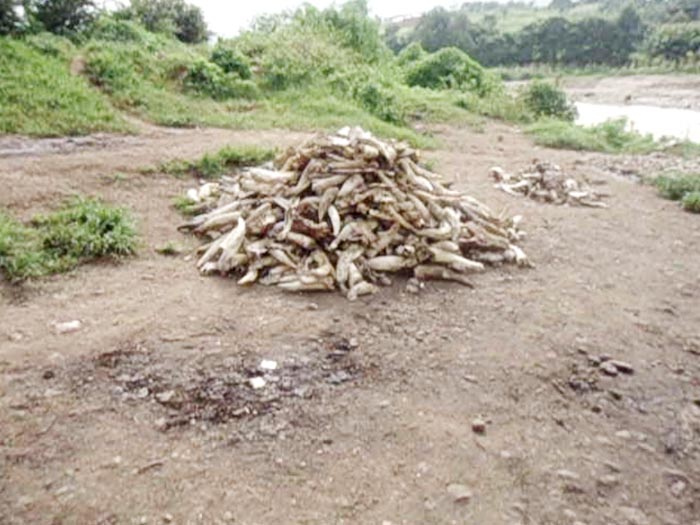Just at Mugere River, there is a small slaughterhouse. All waste composed of blood and excrement from goats and cows slaughtered are directed into Mugera River which flows into Lake Tanganyika. Consequently, the Lake is polluted and biodiversity is threatened.–By Lorraine Josiane Manishatse
When arrived at Mugere River Bridge at 8:30, standing on the top side of Mugere River Bridge, there is a slippery slope towards the river. There prevails bad smell and we find a swarm of flies because of blood and excrement of goats and cows killed there. The place is almost empty; no people movement, no meat or animals, because at 6:00 am they always finish to butcher all the animals. But the slaughterhouse is distinctive because of marks of blood, animal excrement and a great number of cow horns. Despite the existence of the slaughterhouse, they always slaughter cows and goats outside. A person met at the place and involved in butchering activities indicates that the slaughterhouse has been operational since 4years. Previously, that slaughterhouse was at Kizingwe area where people living around complained about their health and the bad smell. So, it was removed to that place far from people’s living houses. At least, 10 cows and more than 10 goats are slaughtered per day. “That place is useful for many people in that area. The big quantity of meat consumed and sold in Kanyosha Commune’s markets are supplied here. We know that we pollute water but, now we are trying to build a modern slaughterhouse which fulfils the required norms,” he justifies.
Environmental Impact Assessment is a must
According to the Decree No 100/22 of 7 October 2010 on the implementation of environment code related to the procedure of Environmental Impact Assessment in its article 4, slaughterhouses located in urban areas are among work projects which must be submitted to an Environmental Impact Assessment. But article 5, stipulates that the Minister in Charge of Environment can grant the Environmental Impact Assessment following his judgment in all slaughterhouses found in rural areas. For Pr Gaspard Ntakimazi, an Expert in Aquatic Environment and Lecturer at the University of Burundi, the administration should apply the law, following the decree signed by the President of the Republic. He mentions that the slaughterhouse fixed just at Mugere River is out of norms because all waste is thrown into the river, causing then water pollution. Consequently, Lake Tanganyika is also polluted as Mugere River flows into it. “When blood and animal wastes are thrown into the water, they consume oxygen during decomposition and biodiversity dies or runs away because they are not comfortable because of the lack of enough oxygen. This waste causes also esthetic pollution,” he regrets. Ntakimazi highlights that these kinds of waste from animals do not contain toxic elements but only parasites that can contaminate human beings who use that polluted water from the lake. In the same way, Jeanne Francine Nkunzimana, the Director of Sanitation and Water Quality Control in the Ministry of Environment, insists that a slaughterhouse cannot be created near the river.
It is worth stating that the slaughterhouse is not officially known or recognized because it hasn’t any Environmental Impact Assessment. “We cannot accept it whereas we have realized that all waste is thrown into the river,” she states.
Administration’s responsibility
People wonder how anarchic activities like that might have worked for four years without the administration’s reaction; unless the law doesn’t affect the owner of that slaughterhouse! Jeanne Francine Nkunzimana, the Director of Sanitation and Water Quality Control in the Ministry of Environment argues that they have visited the place three times in order to forbid butchers to continue their activities, but in vain. “We always arrive there when they have already finished butchering. We have asked the land owner to stop them but he responded that they have refused. Now, we are working with the Pubic Security Force in order to use force to arrest their activities because there isn’t any other way,” she concludes.















 IWACU Open Data
IWACU Open Data

